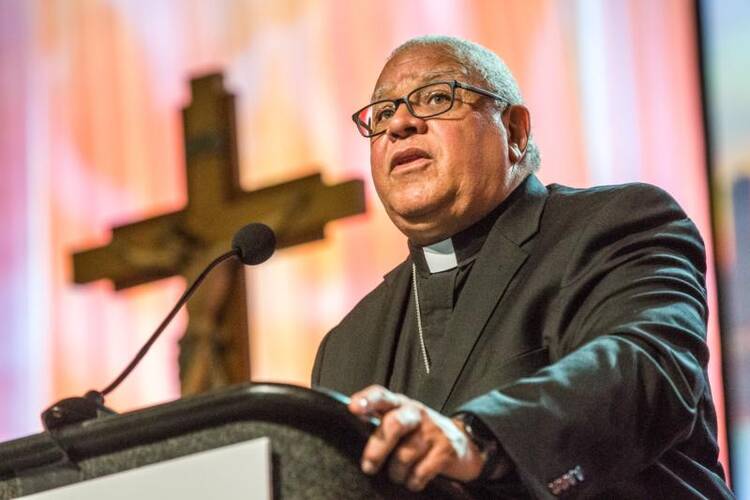YOUNGSTOWN, Ohio (CNS) -- Bishop George V. Murry, the fifth bishop of the Diocese of Youngstown, died June 5 at Memorial Sloan Kettering Hospital in New York, after a two-year battle with leukemia, the diocese announced. He was 71.
Bishop Murry had been admitted to Sloan Kettering for in-patient treatment May 30, a few days after submitting a letter of resignation to Pope Francis.
The bishop, who was receiving treatment for his illness from St. Elizabeth Youngstown Hospital and the Cleveland Clinic, cited his limited stamina and the advice of his physicians for his decision to resign.
Funeral arrangements are pending.
Bishop Murry served as chairman of the U.S. Conference of Catholic Bishops' Ad Hoc Committee Against Racism for a time and often spoke of the need of the church to more firmly address racism in its ranks and throughout society.
During a presentation at the Ignatian Family Teach-In for Justice in 2018, Bishop Murry invited attendees to envision a more just world through reform within the Catholic Church.
Referencing his work as chairman of the Ad Hoc Committee Against Racism for the U.S. Conference of Catholic Bishops, he explained noted that while racism "is America's most persistent sin, it appears as if the American Catholic Church has been virtually silent about."
In a call to action, Bishop Murry invited his audience to develop personal relationships with others of different backgrounds and cultures, urging participants to "listen to their story, to walk in their shoes, then to use the gifts that you have been given ... to offer people on the margins opportunity."
Christopher Kerr, executive director of the Ignatian Solidarity Network that plans the annual teach-in, mourned the loss of Bishop Murry.
Recalling the 2018 presentation, he said Bishop Murry's involvement left a positive impact on young people who attended the event. "He challenged us, but also gave us hope, Kerr said.
Bishop Murry was appointed to the Diocese of Youngstown in 2007. During his tenure, he served in other capacities with the U.S. Conference of Catholic Bishops, including chairman of the Committee on Priorities and Plans, the Committee for Religious Liberty and the Committee on Catholic Education. He also served as chairman of the board of the National Catholic Educational Association and was on the board of directors of Catholic Relief Services.
As Catholic education committee chairman, Bishop Murry advocated for broader emphasis on how Catholic schools "transform" the lives of students.
"Many parents don't see particular value in the religious formation that occurs in a Catholic school," Bishop Murry said in an interview with Catholic News Service in January 2018. "So how can we challenge some of those ideas so people come to a better understanding of why it is important to develop the entire person?"
He called for greater evangelization among Catholic parents by pastors and educators so that the understand how Catholic schools "train the whole person … the mind academically, the body in sports, but also to develop the spiritual life," he said.
Bishop Murry was appointed in 2015 to serve on the Synod of Bishops on the Family in Rome. That same year, then-Ohio Gov. John Kasich named Bishop Murry to the Ohio Task Force on Community-Police Relations.
Born in Camden, New Jersey, Dec. 28, 1948, to Viola and George Vance Murry II, he was baptized into the African Methodist Episcopal Church. He attended Camden public schools but later transferred to St. Bartholomew School in Camden, where he embraced Catholicism. He advanced to Camden Catholic High School.
He progressed to St. Joseph's College in Philadelphia, St. Thomas Seminary in Bloomfield, Connecticut, and St. Mary's Seminary in Baltimore, where he received a bachelor's degree in philosophy in 1972.
That same year, he entered the Society of Jesus. He was ordained for the Maryland province of the Jesuits June 9, 1979.
He earned a master of divinity degree from the Jesuit School of Theology and a doctorate in American cultural history from George Washington University in Washington in 1994.
Bishop Murry served on the faculty and was dean of student activities at Gonzaga College High School in Washington from 1974 to 1976. He was became an assistant professor of American studies at Georgetown University in 1986, where he taught until 1990.
He was appointed president of Archbishop Carroll High School in Washington, serving from 1989 to 1994, and then was named associate vice president for academic affairs at the University of Detroit Mercy.
On Jan. 24, 1995, St. John Paul II named him an auxiliary bishop of Chicago, and his episcopal ordination was March 20, 1995.
St. John Paul appointed him coadjutor bishop with the right of succession of St. Thomas in the Virgin Islands May 5, 1998. Bishop Murry became bishop of the diocese June 30, 1999 and served there until his appointment to Youngstown.








